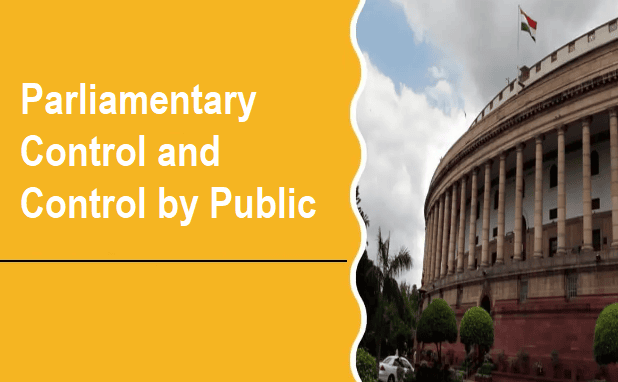Parliamentary Control and Control by Public | Administrative Law - CLAT PG PDF Download
| Table of contents |

|
| Parliamentary Control |

|
| Statutory Provisions |

|
| Parliamentary Committees |

|
| Control by Public |

|
Parliamentary Control
Public corporations are established and owned by the State, funded by public resources, and often hold full or partial monopolies in specific industries, trades, or businesses. These corporations are expected to operate in the public interest, necessitating some level of control and oversight by Parliament. There are four primary methods through which this control is exercised:
Statutory Provisions
- Public corporations are created by statutes passed by Parliament or State Legislatures. These statutes outline the powers and responsibilities of the corporations.
- If a corporation oversteps its authority, Parliament or the State Legislature has the power to dissolve, supersede, or abolish the corporation.
- While this level of control is not often used, it serves as an important check on the misuse of power by corporations.
- Parliament also exercises control by "laying" techniques, where members can question the functions of public corporations through the concerned Minister.
- However, this method is not always effective due to the strong authority of public corporations in their respective fields.
- Questions can be raised about policy issues, ministerial actions, or matters of public interest, but routine administrative queries are generally not allowed.
Parliamentary Committees
- Parliamentary committees play a crucial role in overseeing the operations of public corporations.
- Given Parliament's busy schedule, it cannot delve into the specifics of every corporation's activities.
- To address this, the Committee on Public Undertakings was established in 1964.
- The committee's responsibilities include:
- Reviewing reports and accounts of public undertakings.
- Examining reports from the Comptroller and Auditor-General related to public corporations.
- Assessing whether the management of public corporations aligns with sound business practices and efficiency.
- While the committee's recommendations are advisory and not legally binding, they carry significant weight.
- Traditionally, the government adheres to these recommendations, and if it chooses not to, it must provide justifications.
Conclusion
- Despite being described as "diffuse and haphazard," parliamentary control over public corporations is essential.
- Parliament must ensure that corporations do not exercise excessive freedom and remain accountable.
- The aim of establishing autonomous undertakings is to grant them operational independence without constant parliamentary oversight.
- However, given the public nature of their functions, Parliament cannot entirely relinquish its oversight role.
- While day-to-day operations should be left to the corporations, Parliament must maintain supervision over significant policy matters.
Control by Public
- Public corporations are established for the benefit of the public and are accountable to them. In addition to judicial, parliamentary, and governmental control, these corporations must also consider public opinion.
- Consumer councils, set up by statute, allow consumers to voice their grievances, but often lack the technical knowledge or interest needed for effective oversight. Members of public corporations may be nominated by local authorities and other interested bodies, and certain members may be required to have specific qualifications.
- With the rise of administrative law and consumer rights, individuals and organizations increasingly approach the courts to address grievances, sometimes through Public Interest Litigation (PIL). The Consumer Protection Act of 1986 was enacted to safeguard consumer interests, establish consumer councils, and set up mechanisms for resolving consumer disputes.
Consumer Councils
- Established by statute to allow consumers to express grievances and opinions to corporations.
- Notable examples in the electricity and gas industries.
- Challenges include lack of technical knowledge and interest from the general public.
- Limited impact on policy changes despite making recommendations.
Consumer Representation in Corporations
- Parliament sometimes nominates members of public corporations through local authorities and interested bodies.
- Examples include Hospital Management Committees appointed by Regional Hospital Boards in consultation with local health authorities.
- Statutes may require certain members to have specific qualifications.
Consumers and Courts
- Increased awareness of administrative law and consumer rights has led to more court cases by consumers.
- Consumers approach courts individually or through organizations via Public Interest Litigation(PIL).
Consumer Protection Act
- Enacted in 1986 to protect consumer interests and establish Consumer Councils.
- Provides for the resolution of consumer disputes and related matters.
|
33 docs|9 tests
|
FAQs on Parliamentary Control and Control by Public - Administrative Law - CLAT PG
| 1. What is the role of parliamentary committees in exercising parliamentary control? |  |
| 2. How does parliamentary control enhance the accountability of the government? |  |
| 3. What statutory provisions govern parliamentary control in India? |  |
| 4. How does public control complement parliamentary control? |  |
| 5. What are some challenges faced by parliamentary committees in exercising control? |  |



















